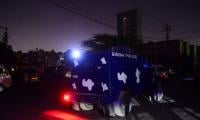ISLAMABAD: Prime Minister Imran Khan on Monday warned that the country was yet to experience the peak of coronavirus cases in late July or early August and urged the nation to strictly follow the standard operating procedures (SOPs).
"I appeal to the nation to show seriousness in adopting the SOPs, lest it could put your lives and those your near ones at risk," he said in a televised public message. The prime minister said easing of lockdown never meant the virus had faded away. "We are aware that the virus is here to stay, but we have to slowdown its spread through precautions," he said, regretting the casual attitude of the people towards the pandemic. He mentioned that the government had lifted the lockdown to facilitate the general public, particularly the poor and labourers. "However, it has some conditions attached to.
Carry on with your business but keep in mind the SOPs," he stressed. The prime minister urged people to wear masks, as research had showed its effectiveness with fifty percent reduction in spread of the virus. He stressed that ignoring the SOPs could greatly risk the lives of elderly and other people with underlying health conditions. He mentioned that even the United States of America with 0.1 million deaths due to coronavirus had eased lockdown, as no country could prolong it in view of inflation and poverty. Imran said gradual opening of routine business was aimed at slowing down the spread of COVID-19 to avoid burden on hospitals.
He said efforts were afoot to arrange 1,000 more beds with oxygen supply units for Intensive Care Unit across the country. Also, an application ''Pak Nigehban'' has been introduced allowing users to see availability of beds and ventilators in real-time at various health centers across the country.
Meanwhile, the federal government announced it was working on increasing the bed capacity for coronavirus patients in major cities across the country. “We have decided in the NCOC meeting this morning that the federal government will ensure increase of 1,000 beds with oxygen supply capability in the major cities of the country within the month of June,” Federal Minister for Planning and Special Initiatives Asad Umar announced in a tweet. The Centre will initiate fast-track approval for enhancement of the country’s healthcare capacity, particularly in relation to the critical care. The decision has been taken in view of the possibility of a contingency situation arising as a result of the exponential increase in cases of Covid-19 in the weeks ahead.
Moreover, the NCOC has also approved procurement requirements for the Isolation Hospital and Infectious Treatment Centre (IHITC) constructed on turnkey basis in Islamabad by the Frontier Works Organization on behalf of the National Disaster Management Authority and the National Institute of Health. The 250-bed prefabricated state-of-the-art hospital will be utilized for treatment of patients infected both by the coronavirus as well as other infectious diseases. The IHITC consists of five wards having single rooms and an ICU each, two general wards, emergency department, diagnostics, a mortuary, and an incinerator. Doctors’ accommodation and a mosque are also part of the facility.
According to a press release issued by the NCOC, 52 ventilators have already been dispatched to Sindh through the NDMA, while a tranche of 50 additional vents will be delivered to the provincial government within the next 48-72 hours. “The NCOC is in consultation with the provincial administration of Sindh to create capacity for additional beds capacity; training of human resource for operationalisation of beds is underway,” the press release informs.
In Khyber Pakhtunkhwa, 72 additional vents have been provided in the last one week, with efforts underway for enhancement of hospital beds in Mardan, Nowshera, Swabi, and Peshawar. Similarly, 72 additional vents have been provided to Punjab during the last one week, and additional beds for Covid-19 patients will be available by the third week of June. Balochistan has received 10 vents, which have already been installed, while work on human resource to meet additional requirements is underway. There is no burden on the healthcare system of Gilgit-Baltistan, which currently has 62 vents, while another 10 will shortly be dispatched.
Meanwhile, a meeting of parliamentary leaders in the National Assembly was held at the Parliament House on Monday to discuss modus operandi for conducting sittings of the National Assembly in view of the rising number of corona cases.
Initiating the discussion, Speaker National Assembly Asad Qaisar said 13 members of the National Assembly had tested positive for Covid-19 besides a significant number of staff. Asad urged all the members to follow the SoPs since he and his family members had been a victim of the virus. Asad said he could feel the agony and pain the corona virus patients and their families undergo.
It was agreed that health guidelines and SoPs would be followed in letter and spirit by the MNAs and the National Assembly staff. It was decided that no legislative and non-legislative agenda would be taken up during the session giving maximum opportunity to members to take part in the general discussion on budget and its passage. The meeting was attended by Deputy Speaker Qasim Khan Suri, ministers Shah Mehmood Qureshi, Pervaiz Khattak, Special Assistant to the PM for Parliamentary Affairs Zaheer Udin Babar Awan, MNAs, Khawaja Muhammad Asif, Raja Pervaiz Ashraf, Ahsan Iqbal, Syed Naveed Qamar, Ayaz Sadiq, Asad Mehmood, Abdul Wasay, Khalid Hussain Magsi and Iqbal Muhammad Ali Khan.
In a related development, Federal Minister for Railways Sheikh Rashid Ahmad also tested positive, the railways ministry announced. According to the statement, Sheikh Rashid was showing no symptoms of the virus. However, he has self-isolated himself for two weeks. Later the minister took to Twitter to say he had tested positive for the virus. He maintained that he was not showing any symptoms and was fine.
Former prime minister and PML-N Senior Vice President Shahid Khaqan Abbasi also tested positive. Abbasi has quarantined himself at his residence. PML-N spokesperson Marriyum Aurangzeb has confirmed that Shahid Khaqan Abbasi had isolated himself after his test came positive.
Meanwhile, the number of confirmed cases in the country rose to 104,210 cases with hospitals warning that they were running out of beds to treat patients.
Of the total confirmed 104,210 cases Sindh reported 38,108 cases, Punjab 38,903, Khyber Pakhtunkhwa 14,006, Balochistan 6,516, Islamabad Capital Territory (ICT) 5,329, Gilgit-Baltistan 952, and AJK 396.
Of 2,080 deaths, Punjab reported 683 deaths; Sindh 715, Khyber Pakhtunkhwa 587, Balochistan 54, Gilgit-Baltistan 14, Islamabad Capital Territory 52, and Azad Jammu and Kashmir (AJK) 8.
Pakistan, India, and Afghanistan lag behind western nations in virus tolls, but experts warn a lack of testing or accurate reporting in rural areas could be hiding true figures. Doctors at several main hospitals in the Lahore said they were running out of beds, ventilators and other vital equipment. "As the cases increase, more health care workers are also falling victim to the virus," said Farooq Sahil, a doctor at Services Hospital Lahore.
Khizer Hayat, Chairman of the Young Doctors Association of Punjab, said facilities across the province needed help."Hospitals are running out of beds; there aren´t enough ventilators given to us," he told AFP.In Karachi, health centres are turning away the sick, with a large sign near the entrance of the Indus hospital stating there was no room for the coronavirus patients. "The crisis is unfolding now as we have ceased to observe isolation," said Sikander Ali Memon, who is leading Sindh province´s anti-virus efforts.
In southwestern Balochistan province, government spokesman Liaquat Shahwani told AFP the situation was serious, and authorities were struggling to cope.
In order to ensure public safety amid the rising cases, administrative actions for implementation of the standard operating procedure (SOPs) have been taken all across the country. Reports received from the provisional officials during last 24 hours indicated that the administrative action had been initiated against the violators of SOPs and social distancing in public places and high-risk areas of markets, public transport and industrial sectors as follows
Balochistan: 294 violations have been observed due to which 128 shops and 57 transports/vehicles have been temporarily closed/fined and cautioned.
Punjab: Special teams have been made for checking various markets, bazaars, transport & industrial areas. 792 shops, 4 industries, 610 transports have been closed, fined, cautioned all across province on 2593 SOP violations.
Sindh: Strict actions, including closure of shops and transport, have been taken against SOPs violators all across the province.
Khyber Pakhtunkhwa: 406 SOP violations have been observed in which two shops, and 22 transports have been cautioned/sealed, while 1,241 individuals have been fined.
Gilgit-Baltistan: 43 shops and 47 transport have been fined/ sealed on 153 violations of health guidelines/instructions.
ICT: 44 SOPs violations were marked in the ICT. 23 shops, two industries and 11 transports were fined/sealed.
Azad Jammu and Kashmir: 379 SOPs violations have been observed during which 55 shops and 87 transports have been fined/sealed.
Comments came after Trump reprised his complaint that multiple indictments against him were politically motivated
Wins are Labour’s latest in local elections to councils and mayoralties on Thursday
267 raids were conducted against elements involved in Hawala, Hundi and illegal currency exchange
The mountaineer ascended the peak at approximately 8:50am
Fayyaz Watto given additional powers of DG administration
His oath-taking ceremony was scheduled on Sunday which was postponed due to personal reasons







